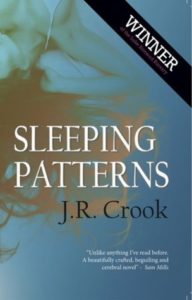 The latest winner of the Luke Bitmead Award, the prize I won myself back in 2008, Sleeping Patterns is an intelligent, intriguing and ultimately rewarding book.
The latest winner of the Luke Bitmead Award, the prize I won myself back in 2008, Sleeping Patterns is an intelligent, intriguing and ultimately rewarding book.
It’s experimental in nature. The author, J.R. Crook, stated in an interview with his publisher that “the most obvious influence on Sleeping Patterns was probably Roland Barthes’s (in)famous essay ‘The Death of the Author,’ together with the related thoughts of Foucault.” He also listed Sartre, Calvino, Joyce, Musil and Pessoa as influences.
So you won’t be surprised when I tell you that Sleeping Patterns is a far from straightforward narrative. The games begin, in fact, in the dedication, “to the memory of the author”. The introduction is written by one of the characters in the book, Annelie Strandli, and she explains that J.R. Crook is dead and she’s put the book together out of 15 stories sent to her by post.
In fact, J.R. Crook is alive and well – I saw him receive the prize and the large cheque for the Luke Bitmead Bursary last year, and chatted with him briefly afterwards. So the dedication is part of the fiction, and presumably a nod to the Barthes essay mentioned earlier. (If you’re interested, by the way, the essay is available online here. The point appears to be that the author is divorced from the text at the moment of its creation, and it becomes the property of readers. It is readers who create meaning in the text, and critics’ traditional role of seeking authorial intention is pointless.)
The 15 stories were sent to Annelie out of order, and she’s preserved that order in the book, while numbering the chapters to show their “true” order. So we begin with chapter 5, then go to chapter 1, then chapter 11, and so on. The story, such as it is, tells of the strange relationship between Annelie and Berry Walker, a writer who lives in the same student residence in south London, as does Jamie Crook. Annelie tries to understand the enigmatic Berry by sneaking into his room and reading stories that he leaves in his desk drawer.
The twist at the end is very clever and ties things together beautifully. I won’t divulge it here for those who are interested in reading the book, but it’s one of those good twists that throws a new light on what was really happening in the book while being completely credible. It’s unexpected, but when you read it you feel as if you should have expected it. It’s also, as you’d expect, tied up with the questions of authorship and interpretation of texts that so fascinate J.R. Crook (the real one, not the character in the book).
Sleeping Patterns is a ‘minimalist’ book. Well, OK, it’s short. Just 108 pages, and that’s with some pretty generous white space. But the length feels about right for this book. The story of Berry and Annelie is not in itself particularly compelling, and the writing style creates a distance between the reader and the characters. At no point did I experience the illusion that I had really entered the world of the characters. It wasn’t that the characters were not believable or well-drawn; it was more that the disjointed narrative and the appearances of the author kept reminding me that I was reading a work of fiction. Because of this distance, I think the work might have failed to sustain my interest for 400 pages. As clever and well-constructed as the literary puzzle was, it was still a literary puzzle, and such things are best kept brief. 108 pages felt about right.
Overall, I’d definitely recommend this as a good, thought-provoking read. Although it’s quite a complex book, and despite the somewhat heavy list of influences, it’s not a difficult read. It’s the kind of book where the more you put into it, the more you’ll get out. But you don’t need a PhD in cultural studies to enjoy it. It’s a book that speaks to the intellect rather than the emotions, and as such it will appeal to some but not others.
If this sounds like your kind of thing, here are a few links to other books I’ve reviewed that you might enjoy:
- Milan Kundera: Identity
- Tom McCarthy: C
- Italo Calvino: Invisible Cities, t zero, If on a Winter’s Night a Traveler, Mr Palomar
- Aleksandar Hemon: The Question of Bruno
- Alois Hotschnig: Maybe This Time
To read more reviews of Sleeping Patterns, you could check out Curious Book Fans, The Book Bag, One Man Book, David Hebblethwaite, or the reviews on Amazon.




There are 13 comments
This actually means that it is far from predictable what kind of book will win the prize, right? Your novel which I liked a lot wasn’t experimental at all. I’m not sure if I would enjoy this. It could be though. I’m curious about the twist at the end.
Hi Caroline,
Yes, they choose quite different types of book for the prize – the year after me, the winner was a crime novel. It’s an open competition and the judges just choose a manuscript that grabs them – they don’t seem to be looking for a particular type.
I’m not sure if you would like it, but I think it’s worth a try, especially as it’s so short. I’m always more willing to try something different when reading 100 pages vs 1,000!
The reasoning for calling himself dead is incredibly interesting, if morbid. I like the sound of the ordering of the chapters, too, I’m wondering if this is one of those books that require two read-throughs. Either way I will definitely be looking at the links you’ve given to other sites, the randomness of the book, compared to more linear works, is appealing.
Yes, it’s definitely good to read it again. I read through it in the ‘correct’ numbered order, and it was interesting to see the difference it made. The structure was really thought through quite carefully so that it made sense both ways. The appearance is random, yes, but I think it was very carefully thought out. Glad it appeals!
But… he doesn’t call himself dead. He dedicates the book “to the memory of the author”. That is, he dedicates it to the author’s MEMORY – meaning the things that the author is remembering. That’s the whole point of the book.
Hi Davida
Interesting point! I can see that the dedication could have that meaning, but doesn’t Annelie in the introduction also say that Jamie Crook is dead and she’s piecing the book together from pieces of text sent to her? It’s been a while since I read the book, and unfortunately I don’t have it to hand to check, but that’s my memory of it.
This sounds terrific. I love novels with innovative structure and premises. Of course such things can be gimmicky. Based on your commentary that does not seem the case here.
Yes, it’s good to read a book that tries to do something different. I know what you mean about gimmicky – that’s always a risk – but it didn’t come across that way to me at all. There was a clear justification for the structure that he used, and it all tied together really nicely.
I just saw your post where you have interviewed J.R.Crook and I thought that I should read your review first. Loved your review! This looks like a really interesting book – chapters which are not in order and randomly put together (apparently), the author making appearances in the story, the introduction written by one of the characters in the story – wow! This is so good! It is really experimental, in a good way. It makes me remember Italo Calvino’s ‘If on a Winter’s Night a Traveller’ and Somerset Maugham’s ‘The Razor’s Edge’ (the author is a character in the story). I will look forward to reading this book. I read about that Roland Barthes essay when I studied literary theory for a while last year and what he says is really interesting.
Thanks for this wonderful review, Andrew! And you have read some really amazing experimental works 🙂 So jealous of you!
Hi Vishy
It is a very interesting novel, and yes, you’re right to draw a parallel with Calvino’s book – there are no direct similarities, but it is a similar type of novel, and the author lists Calvino as an influence. I haven’t read that Somerset Maugham story – will look it up!